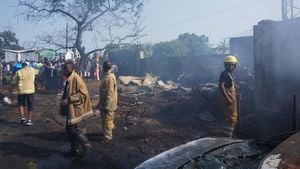The Rohingya refugee crisis continues to resonate as one of the most pressing humanitarian disasters of our time, particularly impacting India and its neighboring regions. The plight of approximately 1 million Rohingyas, who escaped systemic violence and ethnic cleansing perpetrated by the Myanmar military, reveals the grim realities of their existence within detention camps and refugee settlements.
A recent report led by the non-profit organization Refugees International and The Azadi Project highlights the troubling conditions faced by Rohingya refugees held primarily in detention camps across India. Families are routinely separated, sanitation is alarmingly poor, and more than 22,500 Rohingyas—registered with the UN High Commissioner for Refugees—are left languishing without adequate support. Detention facilities have been likened to ‘jail-like’ structures where human rights commitments have been grossly overlooked.
Farida, 26, who sought safety from Myanmar's violence and was detained for 14 months, shared her harrowing experience. "Those interrogations are normal for us, but I didn’t realise I was being sent to a detention facility," she recounted, emphasizing her fear and the lack of transparency involved during such operations. Her story typifies the experiences of many Rohingyas fleeing the systematic violence branded by the UN as “textbook ethnic cleansing.”
Meanwhile, the situation is compounded by political tensions between India and Myanmar, alongside the protests from the Rohingyas themselves, who often face stigma and are labeled as “illegal settlers.” The Indian government has often framed these asylum seekers as potential security threats, which has resulted in heightened scrutiny and limited support for these vulnerable communities.
The broader geopolitical dynamics have made it increasingly difficult for Rohingyas to envision returning to their homeland, especially now with the emergence of the Arakan Army (AA) as the controlling force within Rakhine state, where many Rohingya once called home. Despite previous intentions for repatriation, the AA's conflict and historical fraught relations with the Rohingya community have deepened the crisis.
The complexity of the crisis transcends mere geography; it encapsulates the challenges faced by children growing up displaced and stateless. Across camps, thousands of Rohingya children experience life void of the stability and security mandated by international law. Many children, like Shakeera Bibi, spend their formative years trapped in environments characterized by poverty, trauma, and uncertainty, attending schools with outdated curricula devoid of any preparation for life beyond the camps.
The educational and developmental gaps faced by Rohingya children remain of immense concern. Currently, the education system follows Myanmar's curriculum, which loses its relevance due to the prolonged displacement. Children like Shakeera struggle academically, finding themselves far behind peers of the same age. They receive inadequate schooling under extreme conditions lacking basic resources.
Health concerns are equally dire. Malnutrition runs rampant, with food aid often failing to meet the nutritional needs of children who require diverse diets, exacerbated by their precarious living conditions. These children frequently suffer preventable diseases and lack mental health support, leaving them traumatized by experiences of violence and loss.
Safety presents another hurdle; overcrowded camps become hotbeds for violence, trafficking, and exploitation. Reports of armed attacks targeting children have emerged, creating environments of fear where guardians apprehensively allow their young ones any semblance of freedom.
Rima, another child shared her hopelessness, reflecting, "We fled for our lives, but we're still in the midst of war. Here, we have no life at all." Her sentiment encapsulates the deep despair shared by many Rohingya children, who are caught between their traumatic past and their uncertain futures.
Addressing the Rohingya crisis requires concerted action from international leaders and humanitarian organizations. Beyond basic humanitarian aid, there must be focused initiatives to provide education, mental health resources, and legal recognition to the stateless Rohingyas. Human rights must be foregrounded, as every child deserves the opportunity to grow, learn, and thrive, no matter their circumstances.
With political instability showing no sign of resolution, the future of the Rohingya rests on the commitment of global actors to end their suffering. Each day spent waiting for repatriation or resolution deepens the humanitarian toll on those longing for home. Although the ultimate goal remains safe and dignified repatriation to Myanmar, immediate steps must be taken to protect and empower the Rohingya today.



